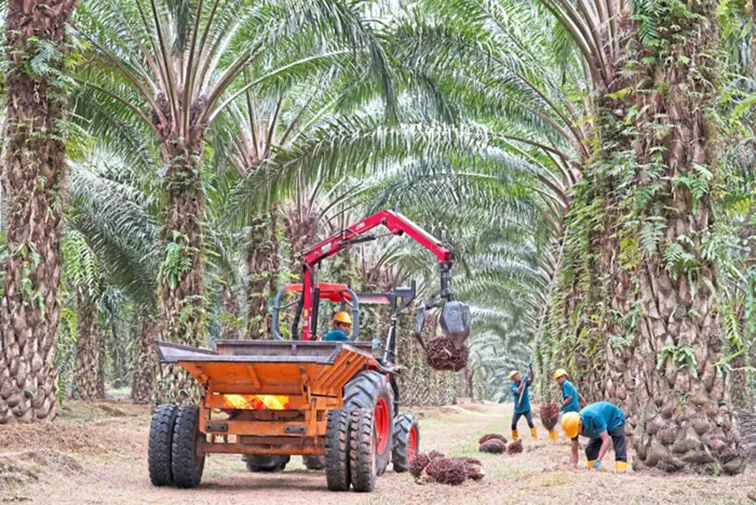Advancing Johor’s Palm Oil Industry through Sustainability and Technology
- Asia Palm Oil Magazine
- Jul 17, 2024
- 4 min read
In 2023, Johor Plantations Group Berhad (JPG), formerly known as Johor Plantations Berhad, emerged as a “new” name within Malaysia’s palm oil industry.
Through the years, JPG has evolved from modest beginnings to become a formidable force in the palm oil industry.
JPG was incorporated in 1978 as a private limited company and a subsidiary of Kulim (Malaysia) Berhad (Kulim), which is wholly owned by Johor Corporation (JCorp).
Over the years, Kulim’s focus shifted towards oil palm plantations and later, agribusiness.

It operates 23 oil palm estates (22 in Johor and one in Pahang) and five palm oil mills. All of JPG’s operation units are certified by Malaysian Sustainable Palm Oil (MSPO) and Roundtable on Sustainable Palm Oil (RSPO).
As of 13 May 2024, JPG had a total landbank of 59,781ha, of which 55,904ha (approximately 93.5%), was planted with oil palms.
All of its palm oil mills have biogas plant facilities and the one in Sedenak is equipped with a biomethane processing plant.
With an unrelenting focus on quality and sustainability, JPG believes it has a competitive advantage due to its track record as an RSPO-certified producer since 2009 and continued investment in crude palm oil (CPO) quality enhancement.
The sustainably-sourced CPO market consists of customers that have more stringent purchasing requirements, such as RSPO certification, complete traceability and lower levels of mineral and other contaminants in the CPO – all of which enable JPG to fetch a premium for its products in the market.
JPG recognizes the need to embrace digitalization as part of its transformation into a progressive, efficient, and profitable company.
It intends for digitalization to be at the core of operations going forward.
Commitment to ESG
JPG’s commitment to Environmental, Social, and Governance (ESG) practices was solidified in 2004 when Kulim became a founding member of the RSPO.
In 2009, the company was one of the earliest Malaysian palm oil producers to be RSPO certified.
Nine years later, it declared its “No Deforestation, No New Development on Peat and No Exploitation (of human rights)” (NDPE) commitment under its sustainability policy.
JPG has designated 1,131ha within its estates as high conservation value areas and 276ha as conservation areas.
Given the importance of conservation in biodiversity hotspots, the company has developed a biodiversity policy that includes the creation of wildlife corridors to ensure the sustainability of indigenous species.
Substantiating its NDPE commitment, the company utilizes satellite imagery to provide the precise locations of its plantations as well as those of some smallholders.
JPG has also committed to reducing its carbon footprint by 50% by 2025 compared to its 2012 baseline and achieving net zero carbon emissions by 2050.
Among various low-carbon initiatives, JPG is deepening its commitment to renewable energy and developing this into a new business vertical.
Initially capturing biogas from mill effluents for use as fuel, JPG has also expanded the potential of using biogas by building a biomethane plant at the Sedenak palm oil mill. It started supplying the biomethane to Gas Malaysia Green Ventures Sdn Bhd (formerly known as Gas Malaysia Virtual Pipeline Sdn Bhd) in August 2023.
Collectively, these ‘waste-to-wealth’ initiatives bring JPG closer to achieving zero waste from its mill operations, something it has been working on for years.
Paving the way into agriculture’s Industrial Revolution 4.0
A great deal of being sustainable rests on operating efficiently.
Towards this end, JPG continues to invest more into mechanization and digitalization of its production process to make way for better cost management and productivity, as well as reduced reliance on manual labor.
Estate operations are enhanced by an internally developed application, K-Plant, which provides real-time monitoring and reporting of various processes including sundry payments, check-rolls, nursery operations and harvesting.
Replacing manual in-field and mill tasks, it provides a shared information database for plantation operations management.
Digital solutions are also increasing operational efficiencies in JPG’s palm oil mill operations.
These include digital weighing, automated control systems, computerized maintenance management systems, Fourier-transform infrared spectroscopy for quality inspection, digital draft control systems for smoke emissions, automated sludge dewatering systems for effluent treatment plants, digital sensors for ammonia level detection in water bodies, and real-time emissions update systems.
Social responsibility and community empowerment
As a truly responsible company, JPG’s vision extends beyond self-transformation to encompass the transformation of its stakeholders and the entire oil palm industry.
The goal is to achieve greater efficiency, sustainability and profitability for all involved.
Committed to empowering local communities, it actively engages its smallholders to help them gain MSPO and RSPO certifications.
As a result of advisory and technical support provided through its smallholder inclusion programme, three out of its 29 external crop suppliers have been certified by RSPO.
It also supports the families of its smallholders and others living in or around its estates, particularly through the provision of education for the children.
In 2023, JPG incurred approximately RM1.2mil on various educational initiatives, firm in the belief that education is one of the most powerful tools to uplift communities in a way that is sustainable and meaningful.
Strategic rebranding and expansion
Following its rebranding, JPG is preparing to become a fully integrated palm oil player by extending its upstream operations into the downstream business.
In January 2024, it signed a shareholders’ agreement with Japan-based Fuji Oil Asia Pte. Ltd. as its joint venture partner to develop an integrated sustainable palm oil complex comprising a downstream refinery, a palm oil mill, a kernel crushing plant, a bio-energy power plant, and an animal feed mill plant, powered by renewable energy, signifying a new phase of growth for JPG.
Source: www.thestar.com.my



